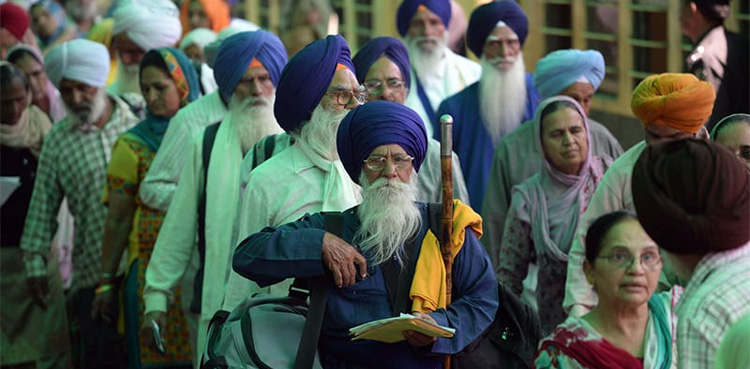
Religious minorities in India have long been mistreated. However, in recent years, this bias has spread beyond the social and political realms, becoming profoundly ingrained in governmental programs. Among the most visible victims of this discriminating approach is the Sikh minority, which played a crucial part in India’s formation but is now more alienated and marginalized. The Indian government’s recent shutdown of the Kartarpur Corridor serves as a glaring example of this injustice. It not only violates religious freedom, but it also symbolizes India’s dissatisfaction with the spiritual ties between Sikhs and Pakistan.
Kartarpur Corridor is a Symbol of Peace and Religious Harmony
The Kartarpur Corridor is a major initiative of goodwill from Pakistan. Inaugurated in 2019, it allows Sikhs from India to visit the famed Gurdwara Darbar Sahib, Guru Nanak’s ultimate resting place, without a visa. The corridor served as a spiritual conduit between the Sikh diaspora and one of their holiest places in Pakistan. Notably, even during times of high military tension, Pakistan kept the corridor open, demonstrating its dedication to religious tolerance and minority rights.
India’s Politicalized Retaliation
In contrast, India’s suspension of the Kartarpur Corridor demonstrates not only a lack of religious sensitivity, but also a deliberate political revenge. The rationale provided, security concerns or geopolitical tensions, is unconvincing. The underlying message is clear: India is penalizing the Sikh community for its spiritual and emotional ties to a sacred monument in Pakistan. This measure is both a breach of religious freedom and an indirect attempt to repress the Sikh identity, which India increasingly sees as a political threat, particularly in light of recent developments surrounding the Khalistan movement.
The Hindutva Ideology of the Modi Government
Under Prime Minister Narendra Modi, India has witnessed the growth of an aggressive kind of nationalism based on Hindutva philosophy. This ethno-religious vision of India has systematically suppressed Muslims, Christians, Dalits, and, most recently, Sikhs. From dubbing Sikh demonstrators during the farmers’ movement as “anti-national” to cracking down on Khalistan supporters abroad, the Modi government has positioned itself against any narrative that contradicts its exclusive view of Indian identity. The closure of the Kartarpur Corridor is thus more than just a cross-border issue; it is part of a larger movement to redefine Indian nationality along exclusionary lines.
Religious Freedom is Under Threat
The Indian state’s purposeful targeting of a sacred pilgrimage path violates the fundamental standards of religious freedom. For millions of Sikhs, visiting Kartarpur is more than just a ritual; it is an exploration of faith, identity, and tradition. India’s actions send a frightening message: the state may and will ban religious practices that are perceived as inconvenient or politically sensitive. In doing so, India not only alienates its Sikh population but also undermines the secular fabric that it claims to defend.
Pakistan’s Responsible Conduct
Pakistan, on the other hand, has consistently pursued a policy of conserving religious monuments and encouraging interfaith tolerance. Pakistan has taken practical steps to protect minority rights, such as rebuilding Hindu temples, safeguarding Sikh Gurdwaras, and maintaining Christian cultural sites. The Kartarpur Corridor is a living example of this policy. Even during periods of diplomatic tension or military escalation, Pakistan has avoided using religious access as leverage, in stark contrast to India’s coercive approach.
The Blindness of the International Community
Equally concerning is the international community’s muted response. When minority rights are infringed in authoritarian nations or non-Western regions, worldwide outcry quickly spreads. However, when India, a so-called democracy, limits religious liberty, the international response is frequently diplomatically restrained. This double standard is both hypocritical and harmful. It allows powerful regimes like India to conduct human rights atrocities with impunity while claiming to be guided by democratic norms.
The Kartarpur Corridor blockage has shown the truth about Indian secularism. Far from being a neutral democracy, India under the Modi rule is rapidly becoming a majoritarian state in which only one identity can thrive. The targeting of Sikh religious sensibilities, as well as the exploitation of spiritual access as an instrument of political vengeance, are evident indications of this tendency.
In contrast, Pakistan’s constant efforts to protect and promote religious freedom, even under the most difficult conditions, provide a compelling counter-narrative. The Kartarpur Corridor should have remained a place of tranquility and spiritual connection. Instead, India’s decision to close it has transformed it into a symbol of religious tyranny and political intolerance.
It is critical that the world community takes note. The issue is more than just a border crossing gate. It is about the importance of religious freedom, the dignity of minority populations, and the future of regional peace. India has violated the spiritual rights of a proud group by targeting Sikhs through this closure, as well as exposing the rising authoritarianism beneath its democratic guise.
